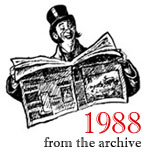
The Secular Mind IV: Relativism
HARVARD DIARY
A medical student taking a course I give at Harvard Medical School came to see me recently about an essay he was writing. As we talked he mentioned an experience he had while going to high school. He was a bright young man, and had been put in an “advanced section” of his senior class. He was taking chemistry and physics (even then he knew he wanted to be a doctor) as well as American history and English and Latin. He was a first-rate student. He also happened to come from a deeply religious Irish Catholic family. His father is a history teacher in another high school in the city where they live — and an especially decent and idealistic person who takes America’s values and principles, as enunciated in the nation’s early political documents (the Declaration of Independence, the Constitution, the Bill of Rights), very seriously and aims to persuade his students to do likewise. His own son, my student, certainly is a chip off the old block — even in high school he tutored children in a ghetto neighborhood and worked as a volunteer in a hospital, while at the same time building up a wonderful academic and athletic record.
One day, during a high school chemistry lab, he saw a student unpacking a substance he had brought with him, and realized the classmate was cheating — had bought rather than prepared a given chemical compound. Even as my student had come to that realization, he saw another student’s elaborate laboratory set up (tubes of glass connected to several flasks) fall apart, some of it breaking — whereupon several students laughed, and no one nearby offered help. The student whose equipment had collapsed lowered her head and began to cry. At that point my student intervened, went across the room, and helped her. Meanwhile, several others kept laughing, as they pursued their own experiments. My student suddenly lost his cool. He banged his chemistry book down on the lab table, and started giving an old-fashioned Ciceronian oration of sorts. He berated himself for being slow at times to help others in need — for being driven, egoistic, selfish, competitive. He asked the other students, some of whom were by then laughing at him, what they thought Jesus Christ would think of that chemistry lab — its ethical life — which he described as “dog eat dog.” He turned to the chemistry teacher, who had been out of the room for a while and had now returned, to ask what he thought of that “underworld scene,” a phrase my student used back then and when he was talking with me.
You May Also Enjoy
For our own sons and daughters we want no drug abuse and a sexuality that is kept under constraints. For others "below" us, quite another point of view obtains.
"Psst! Hey kid, wanna buy a cup o' joe — real cheap? In a cool styrofoam cup!"
In our parlors, with our educated tongues, we deplore not only the Swaggarts of this world but all who attend them, and all who aren't quite "up" to us.

